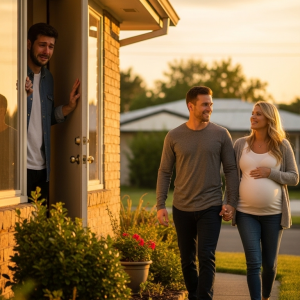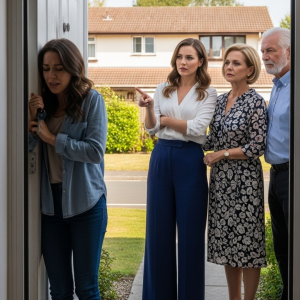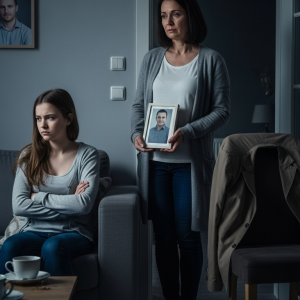I agreed to meet them one last time, not for them, but for me. When I arrived, the apologies started again, a cascade of “we should have known better” and “we’re so ashamed.” Then Vanessa walked in, smiling casually as if we were about to catch up over coffee.
“So, I guess they told you everything, huh?” she said.
I just stared at her. “They told me you lied. That you blamed me for your gambling debts.”
My older sister, Vanessa, has always been… a handful. “Entitled” is the polite term. But over thirty years, I have dealt with her antics, which have ranged from cruel pranks to outright abuse.
When we were teenagers, she shaved part of my head in my sleep. It wasn’t just a prank; it was an act of humiliation, leaving me with a shameful secret to hide under carefully combed hair for weeks.
She used to physically attack me when she didn’t get her way. That behavior only stopped when I fought back hard enough to genuinely scare her. After that, she switched to emotional manipulation.
She secretly signed me up for grotesque magazines, spread vicious rumors at school, and gave out my phone number, forcing me to change it multiple times. She is the reason my husband and I have a prenuptial agreement. It wasn’t a lack of faith in our love, but a necessary shield against her chaos.
So, when she pulled her stunt last Christmas, it wasn’t an isolated incident. It was the latest chapter in a long, exhausting book.
Our family always gathers at my grandparents’ house on Christmas Eve. The house is always warm with the scent of pine and gingerbread, a peaceful facade covering the cracks below. This year, I was traveling for work and wasn’t sure I’d make it.
To ensure my nephews wouldn’t be left out, I shipped a large box of pre-wrapped presents ahead of time. Luckily, my schedule changed, and I managed to drive home the day before, filled with a cautious hope for one peaceful holiday.
The evening was going surprisingly well. Laughter filled the house, and for a moment, I allowed myself to relax. Until it was time to open gifts. All of my presents had the same distinctive wrapping paper, a pattern of silver snowflakes on a deep blue background.
When my two young nephews, ages five and six, received their gifts from me, Vanessa pointed to new name tags pasted over my original ones.
“Oh, look!” she exclaimed with theatrical glee. “Those are from Santa!”
The boys, ecstatic, tore them open. I saw red. Vanessa saw the look on my face and pulled me into the kitchen.
“What the hell do you think you’re doing?” I demanded, my voice trembling with rage.
She stammered, offering a lame excuse. “Well, I thought you weren’t going to be here! It’s better for the kids if they think it’s from Santa.”
“Better for the kids, or better for you?” I yelled, my voice rising. My grandmother rushed in, begging me to keep quiet, to not ruin the “magic.” That’s when I lost it. The commotion drew half the family into the kitchen.
“She relabeled the gifts I bought for my nephews!” I announced to the room.
My grandfather looked at Vanessa, his expression firm. “Is this true?”
She did what she always does when she’s caught: she crumpled to the floor and started sobbing, a full-blown pity party. My grandfather, however, was unfazed. He had seen this play too many times.
He and several other relatives agreed she needed to make it right. “That means the boys technically got nothing from you,” he said pointedly, “and that’s not right.”
An idea sparked. “Fine,” I said, pulling out my wallet. “I’ll give each of them $50. And you,” I said, looking directly at Vanessa, “will pay me back for that, and for the gifts you hijacked.”
My brother-in-law, Bill, sighed and nodded in agreement. His face was a mask of exhaustion and resignation.
I gave my nephews each a crisp $50 bill and told them to buy whatever they wanted. Vanessa spent the rest of the night in stony silence, a mannequin of self-pity.
The next day, Vanessa and her husband showed up at my door. She meekly handed me an envelope with $200 and mumbled an apology.
Her words lacked any sincerity, a script read from memory. She immediately tried to launch into another string of excuses before Bill cut her off.
“Just stop,” he said, his voice weary. “What you did was a crummy thing. There’s no excuse.”
It was a rare moment of clarity from him, an admission that his wife’s chaos was indefensible. I just nodded, took the envelope, and closed the door. No forgiveness was offered because no real remorse was felt.
Weeks later, the truth behind her actions began to surface. My parents called, their voices strained. They wanted me to come home to “talk.” Something was bigger than stolen Christmas gifts.
And that is what led to this final meeting. The confrontation that wasn’t just about presents, but about thirty years of deception.
I sat across from them in my parents’ living room, the same room where we had celebrated so many holidays. The air was heavy. My parents looked older, the lines of worry etched deeper into their faces.
“We’re sorry, honey,” my mother began. “We should have seen it. We should have been firmer with Vanessa.”
Vanessa entered, and the room seemed to shrink. Her casual smile was an insult, a complete denial of the situation’s gravity.
“So, I guess they told you everything, huh?” she said, her tone light.
I let the silence stretch, watching her. I saw the flicker of panic in her eyes before she masked it with false confidence.
“They told me you lied,” I said, my voice even and cold. “They told me you took their money. That you have gambling debts and when they found out, you tried to blame me.”
The color drained from Vanessa’s face. The confidence vanished, replaced by the look of a trapped child.
My father continued, his voice heavy with disappointment. “She took thousands of dollars over the last few months. We thought she was just struggling. When we confronted her, the first thing she said was… she said you convinced her to invest in a business scheme.”
Every piece fell into place. The Christmas gift-stealing wasn’t just a petty act; it was the act of a desperate person, trying to maintain appearances while their world was collapsing. She couldn’t afford to buy her own children presents.
“And you believed her?” I asked, though I already knew the answer.
“Only for a minute,” my mother said quickly. “But it didn’t make sense. It’s not you. We knew that.”
I looked back at Vanessa, who was now staring at the floor, her silence a confession. All the excuses were gone. Every escape route was blocked.
“I want to hear it from you,” I said. “Look at me and tell the truth. For once in your life.”
She raised her head, her eyes brimming with tears, but these were not the dramatic tears of Christmas Eve. These were the real tears of failure.
“I’m sorry,” she whispered. “I was in trouble. I didn’t know what else to do.”
“So you chose to ruin me?”
Her silence was her answer.
I stood up. The room felt suffocating. I looked at my parents, who had enabled this behavior for decades by always trying to “keep the peace.” I looked at Bill, who chose to live his life beside this hurricane. And finally, I looked at my sister.
“I’m done,” I said, my voice firm. “No more family gatherings. No more fake phone calls. Don’t contact me. Don’t come to my house. I will continue to send presents for my nephews on their birthdays and Christmas, but they will be shipped directly from a store. I will never put myself in a position where you can hurt me again.”
I didn’t wait for a reply. I walked out of that house, leaving thirty years of chaos behind me. As I stepped into the fresh air, I didn’t feel anger or sadness.
I felt light. I felt free. The long, exhausting book was finally closed, not by her, but by me.
Of course. Here is the continuation of the story, written in English.
The freedom I felt walking away from my parents’ house wasn’t a burst of euphoria, but a deep, quiet settling. It was like the silence that falls after a violent storm has finally passed. In the first few days, I waited for the pushback. I had built a wall, and I knew my family, especially Vanessa, would not let it stand untested.
The peace lasted for exactly three days. Then, my phone began to ring. My mother was first.
“You can’t do this, Clara,” she began, her voice a mixture of pleading and reprimand. “You are tearing this family apart. Vanessa is a mess. She needs us.”
“She needs professional help, Mom,” I replied, my voice deliberately calm. I had rehearsed this response in my head. “And I need peace. I have made my boundary clear.”
“Boundaries?” she scoffed, the word sounding foreign on her tongue. “We’re a family. Families don’t have ‘boundaries.’ You need to be the bigger person and forgive your sister.”
“I have been the bigger person for thirty years,” I said, my patience beginning to fray. “I am done. I love you, but I am not discussing this further.”
I ended the call, my hand trembling, but my heart was steady. For the first time, I hadn’t buckled under her emotional manipulation. It felt terrifying, and it felt powerful. My father texted a few hours later: “Your mother is very upset. Please call her.” I didn’t reply.
They tried for weeks. The missed calls piled up. The texts grew more desperate. My grandmother called, her voice trembling, talking about how important it was to “keep the family together.” I held my ground, repeating my mantra: “I love you all, but my decision is final.”
The silence that eventually came didn’t feel like a victory. It was heavy. I knew this wasn’t acceptance; this was a regrouping. They were planning a new strategy. The first true test arrived in the form of an invitation decorated with balloons and cake: my oldest nephew Leo’s seventh birthday.
The only relationships I mourned were the ones with my nephews. They were innocent lights in a dark family dynamic. I had sworn I would not abandon them.
I spent hours finding the perfect gift for Leo, an intricate robotics kit I knew he would love. I ordered it online and had it shipped directly to their house, along with a card telling him how much I loved and missed him. I paid extra for delivery confirmation. The package arrived three days before his birthday.
The birthday came and went. A week passed. Then two. The silence was absolute. In the past, no matter how badly Vanessa behaved, Bill always made sure the boys called to say thank you. This time, nothing. A cold dread began to creep in. What was Vanessa doing? Intercepting the gifts? Throwing them away?
The truth was worse.
One Tuesday evening, an unknown number called. I hesitated, then answered. “Hello?”
“Clara? It’s me, Bill.”
His voice was exhausted, as if it had been worn down to the bone. He had never called me on his own before.
“Bill? What’s wrong? Are the boys okay?”
“The boys are fine,” he sighed. “Well, physically. I’m calling because… I don’t know what else to do. It’s about Vanessa.”
He explained that her situation was getting worse. The debts were bigger than she had admitted, and she was refusing any form of help. But that wasn’t why he was calling.
“It’s about Leo’s birthday present,” he said, his voice faltering. “It arrived. Vanessa opened it first. She threw out your card and told Leo it was from her and me. She’s telling the boys that Aunt Clara is mad at them, and that’s why you don’t visit anymore.”
The room seemed to tilt. This was a new level of malice, a cruelty even I hadn’t anticipated. She wasn’t just hijacking the gift; she was weaponizing my love for my nephews, turning it into a tool to make them feel abandoned.
“Why did you let her do that?” I asked, my voice sharp.
“I tried,” he said desperately. “But she creates a huge scene in front of the boys, crying and saying I’m siding with you against her. I’m trapped, Clara. I don’t know how to protect them from their own mother.”
The call ended with no solution. I felt a white-hot rage, but beneath it was a piercing sorrow. Vanessa had found my weak spot. She knew I would never hurt those boys, and she was exploiting it without mercy. I realized that protecting myself also meant creating a distance from the only people in my family I truly loved. The price of my freedom seemed to go up every day.
Two months later, Vanessa’s world imploded. Bill finally found the courage to give her an ultimatum: get help for her gambling addiction, or he and the boys were leaving. Instead of accepting, Vanessa flew into a rage, accusing him of abandoning her in her time of need. He kept his word. He moved out with the boys, renting a small apartment on the other side of town.
My family, of course, blamed me. In their twisted logic, if I hadn’t “abandoned” Vanessa, she wouldn’t have spiraled. Bill’s departure was my fault. Her misery was my fault.
I knew desperation would soon drive Vanessa to my door. I just didn’t expect it to be so literal.
It was a Thursday afternoon. I was in an important meeting in my office, a glass-walled space that looked out onto the main lobby. Midway through a presentation, I noticed a commotion at the front desk. And then I saw her. Vanessa. She looked thin and haggard, her eyes wild. She was arguing with the receptionist, pointing toward my office.
I excused myself politely and stepped out, my heart pounding. “I’ll handle this.”
I led her to a small, empty conference room. The moment the door closed, she broke down. But this wasn’t the performative self-pity of Christmas Eve; this was raw, unfiltered panic.
“He left, Clara,” she sobbed. “Bill took the boys. He says it’s my fault, but it’s yours! You did this! You turned your back on me, and now everyone has!”
“No one did this to you, Vanessa,” I said, my voice steady despite the adrenaline coursing through me. “This is the result of your choices.”
“Choices?” she shrieked. “You think I chose to lose everything? I’m about to lose my house. I have no money. My sons think their aunt hates them! I came here because you owe me. You’re my sister!”
She took a step toward me, and I took one back, holding up my hand as a barrier.
“Being your sister is a biological fact, Vanessa, not a blank check for you to cash,” I said, each word clear and sharp. “My debt to you was paid in years of therapy. I’m paid in full.”
“So you won’t help me?” she whispered, her anger dissolving into absolute disbelief. “You’re just going to let me lose everything?”
“I will give you the number of a gambling addiction counselor and a good family lawyer,” I said. “That is the help you need. It is the only help I will give you.”
She stared at me for a long moment, her eyes searching for some crack in my armor, some glimmer of the old sister she could manipulate. She found nothing.
“You’ve changed,” she said, her voice hollow. “You’re so cold.”
“No,” I replied. “I haven’t changed. I’ve healed.”
I opened the door. “You need to leave now.”
She didn’t argue. She walked past me like a ghost and out of the lobby. I stood there long after she was gone, my breathing slowly returning to normal.
The freedom I had felt six months ago was real. But I learned a vital lesson today: winning your freedom is a moment, but keeping it is a lifelong battle. I felt a profound sadness for my nephews, caught between their mother’s chaos and my necessary boundaries. But I also felt a solid core of resolve. The wall I had built was not to punish them. It was to protect me. And it would stand.




